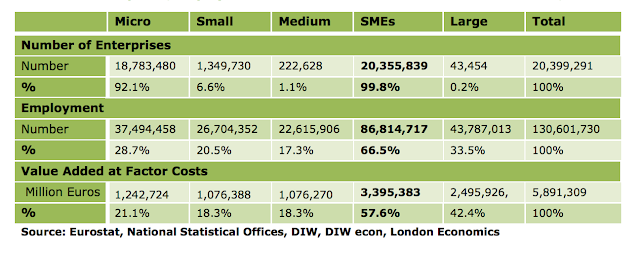Small and medium entreprises (Europe)
 |
| Enterprises, Employment and Gross Value Added of SMEs in the EU-27, 2012 |
Growth
prospects for SMEs are encouraging
European
Commission Vice President Antonio Tajani, responsible for industry and
entrepreneurship said: “Our initiatives to help SME's to make it
through difficult times have paid off. After five years of sluggish development
I am glad to see that SMEs are about to grow again. They are also starting to
recruit more staff. Moreover, our indicators make it clear, that SMEs can grow
further in 2014. SMEs are the lifeblood of our economy as they are now dragging
us out of the most severe crisis of EU economy in the past 50 years."
Important
role of SMEs in economy
The 20,4
million European SMEs play an important role in the European economy. They are
mostly micro-enterprises and employed approximately 86.8 million people in
2012. This represents 66.5% of all European jobs for that year.
Micro-enterprises provide just under a third of that total employment figure.
The SME sector as a whole delivered 57.6% of the gross value added generated by
the private, non-financial economy in Europe during 2012.
SMEs
need to embrace technology to boost growth
Bringing SMEs up to speed with the digital revolution is not just a
matter of improving their quarterly profits, but also about creating European
growth and jobs. The European Commission rightly pointed out in the Entrepreneurship
2020 Action Plan that in the digital age, no business can thrive without better
use of ICT. The Action Plan emphasized that SMEs grow two to three times faster
when they embrace technology. It also encouraged entrepreneurs to exploit the
potential of the EU’s digital single market, which is expected to grow by 10% a
year up to 2016. These recommendations mirror key findings of a recent Boston
Consulting Group (BCG) study on the
benefits of ICT adoption by SMEs, which was commissioned by
Microsoft.
The BCG team surveyed more than
4,000 SMEs across all industry sectors in five countries —the United States,
Germany, China, India, and Brazil – to find out the link between successful
technology adoption and business performance. Unsurprisingly the study showed
that, regardless of their home country, entrepreneurs who were early technology
adopters increased their annual revenues 15% faster than their competitors.
Moreover, they managed to create jobs twice as fast as other small businesses.
The transition of SMEs from “digital
laggards” to “digital champions” can provide a much-needed boost to a sluggish
economic recovery. The BCG report found that, in those five markets, even if
only 15% of SMEs that lag behind in technology implementation and 30% of SMEs
who moderately use technology adopted modern and advanced IT tools, they could
increase their combined revenues by €570 billion and create more than six
million new jobs.


Comments